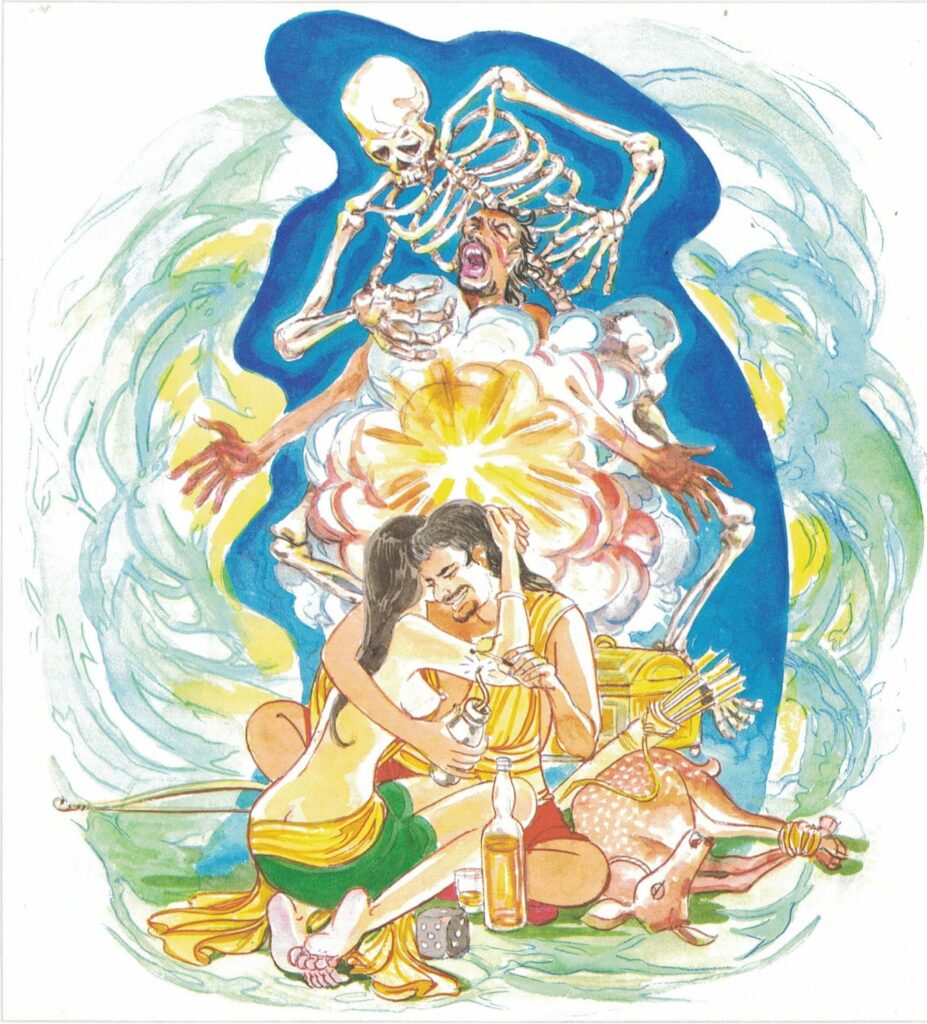Pali text, illustration and English translation of Dhammapada verse 66:
caranti bālā dummedhā amitten’eva attanā |
karontā pāpakaṃ kammaṃ yaṃ hoti kaṭukapphalaṃ || 66 ||
66. Fools of feeble wisdom fare enemies to themselves, making evil kamma which is of bitter fruit.

The Story of Suppabuddha, the Leper
While residing at the Jetavana Monastery, the Buddha spoke this Verse, with reference to Suppabuddha, a leper.
This religious instruction was given by the Buddha while He was in residence at Veluvana with reference to the leper Suppabuddha. The story of the leper Suppabuddha is found in the Udāna.
For at that time the leper Suppabuddha, seated in the outer circle of the congregation, heard the Buddha preach the Dhamma and attained the fruit of conversion. Desiring to inform the Buddha of the blessing he had received, but not daring to force his way into the midst of the congregation, he waited until the populace had paid obeisance to the Buddha, had accompanied him a little way, and had turned back. Then he went to the Monastery.
At that moment the Sakka king of gods thought to himself, “Yonder leper Suppabuddha desires to make known the blessing he has received in the Religion of the Buddha. I will test him.” So he went to him, poised in the air, and spoke thus to him, “Suppabuddha, you are a poor man, a man afflicted with misery. I will give you limitless wealth if you will say, ‘The Buddha is not the Buddha, the Teaching is not the Dhamma, the Sangha is not the Sangha. I have had enough of the Buddha, I have had enough of the Law, I have had enough of the Order.’” The leper said to him, “Who are you?” “I am Sakka.” “Fool, shameless one, you are not fit to talk to me. You say that I am poor and afflicted. On the contrary, I have attained happiness and great wealth: the seven stores of honourable wealth. They that possess these stores of wealth are not called poor by Buddhas or solitary mendicants. When Sakka heard him speak thus, he left him by the way, went to the Buddha, and told him all the questions and answers. The Buddha said to him, “Sakka, it is not possible, even with a hundred pieces of gold, even with a thousand, to prevail upon the leper Suppabuddha to say, ‘The Buddha is not the Buddha, the Dhamma is not the Dhamma, the Sangha is not the Sangha.’”
So Suppabuddha the leper went to the Buddha, and the Buddha received him. And having informed the Buddha of the blessing he had received, he arose from his seat and went his way. Before he had gone very far, he was killed by a young heifer. We are told that this heifer was a female evil spirit who had been a cow in each of a hundred existences, and that as a cow she had killed four youths: Pukkūsāti, a young man of high station; Bāhiya Dārucīriya;Tambadāṭhika, the robber outlaw; and Suppabuddha the leper.
Explanatory Translation (Verse 66)
bālā dummedhā yaṃ kaṭukapphalaṃ hoti (taṃ) pāpakaṃ
kammaṃ karontā amittena iva attanā caranti
bālā: the immature people; dummedhā: unwise men; yaṃ kaṭukapphalaṃ hoti: which brings evil results; pāpakaṃ kammaṃ [kamma]: (that) evil act; karontā: doing; amittena iva: like an enemy; attanā: to oneself; caranti: live.
Those unwise foolish people behave in a manner that is harmful to themselves. Their sinful actions yield bitter fruit. They are their own enemy.
Commentary and exegetical material (Verse 66)
bālā dummedhā: the foolish people lacking wisdom. The two words are more or less synonymous. But the lack of a sense of discrimination, intensifies the meaning of ignorant. The sense of discrimination is compared, in some texts, to lightning in a mountain peak. That bolt of lightning destroys everything on the top of the mountain. In the same way, the wise are capable of destroying all the defilements. But the ignorant person and the person who is incapable of discrimination do not have that capacity to uproot blemishes. The foolish people who lack intelligence commit evil actions that bring them harmful results. They are being enemies to themselves.